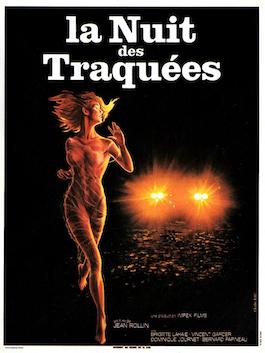The Night of the Hunted
The Night of the Hunted (La Nuit des traquées) is a French horror and erotic film directed by Jean Rollin, released in 1980. The film blends elements of horror, science fiction, and eroticism, characteristic of Rollin's work, and explores themes of memory loss, dehumanization, and the fragility of human identity.
Plot[edit | edit source]
The story revolves around a young woman named Elysabeth who, suffering from severe memory loss, finds herself in a mysterious, high-tech facility where the residents, like her, are unable to recall their pasts or why they are there. As Elysabeth tries to piece together her identity and escape, she discovers the sinister truth behind the facility: it is a place where people afflicted with a mysterious environmental illness that erases their memories are kept under observation. The facility's cold, clinical environment contrasts sharply with the warmth of human connections Elysabeth forms as she and other residents attempt to escape their confinement and the fate that awaits them outside.
Themes and Analysis[edit | edit source]
The Night of the Hunted deals with themes of memory, identity, and alienation, using the horror and science fiction genres to explore the human condition. The film's portrayal of memory loss as a form of societal control and dehumanization reflects broader anxieties about the loss of personal autonomy in the face of technological and bureaucratic systems. Rollin's use of erotic elements serves not only to titillate but also to underscore the characters' humanity and vulnerability in a dehumanizing environment.
Production[edit | edit source]
The film was shot in Paris, France, and is noted for its stark, minimalist aesthetic, which enhances the sense of isolation and alienation central to the film's themes. Rollin's direction emphasizes atmosphere and mood over explicit horror, relying on the eerie, industrial setting and the characters' existential dread to generate tension.
Reception[edit | edit source]
Upon its release, The Night of the Hunted received mixed reviews, with some critics praising its atmospheric direction and philosophical depth, while others criticized its slow pacing and underdeveloped plot. Over time, however, the film has gained a cult following, particularly among fans of European horror and erotic cinema, and is regarded as one of Rollin's more intriguing and thought-provoking works.
Legacy[edit | edit source]
The film's exploration of memory and identity, as well as its unique blend of genres, has influenced a number of filmmakers in the horror and science fiction genres. The Night of the Hunted remains an important work in Rollin's filmography, exemplifying his ability to infuse genre cinema with deeper existential themes.
Search WikiMD
Ad.Tired of being Overweight? Try W8MD's physician weight loss program.
Semaglutide (Ozempic / Wegovy and Tirzepatide (Mounjaro / Zepbound) available.
Advertise on WikiMD
|
WikiMD's Wellness Encyclopedia |
| Let Food Be Thy Medicine Medicine Thy Food - Hippocrates |
Translate this page: - East Asian
中文,
日本,
한국어,
South Asian
हिन्दी,
தமிழ்,
తెలుగు,
Urdu,
ಕನ್ನಡ,
Southeast Asian
Indonesian,
Vietnamese,
Thai,
မြန်မာဘာသာ,
বাংলা
European
español,
Deutsch,
français,
Greek,
português do Brasil,
polski,
română,
русский,
Nederlands,
norsk,
svenska,
suomi,
Italian
Middle Eastern & African
عربى,
Turkish,
Persian,
Hebrew,
Afrikaans,
isiZulu,
Kiswahili,
Other
Bulgarian,
Hungarian,
Czech,
Swedish,
മലയാളം,
मराठी,
ਪੰਜਾਬੀ,
ગુજરાતી,
Portuguese,
Ukrainian
Medical Disclaimer: WikiMD is not a substitute for professional medical advice. The information on WikiMD is provided as an information resource only, may be incorrect, outdated or misleading, and is not to be used or relied on for any diagnostic or treatment purposes. Please consult your health care provider before making any healthcare decisions or for guidance about a specific medical condition. WikiMD expressly disclaims responsibility, and shall have no liability, for any damages, loss, injury, or liability whatsoever suffered as a result of your reliance on the information contained in this site. By visiting this site you agree to the foregoing terms and conditions, which may from time to time be changed or supplemented by WikiMD. If you do not agree to the foregoing terms and conditions, you should not enter or use this site. See full disclaimer.
Credits:Most images are courtesy of Wikimedia commons, and templates Wikipedia, licensed under CC BY SA or similar.
Contributors: Prab R. Tumpati, MD

